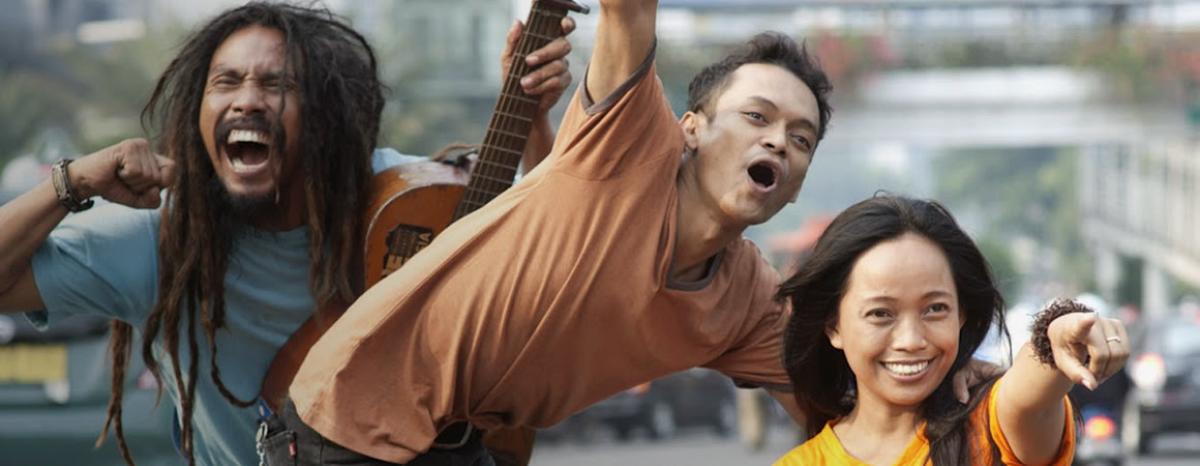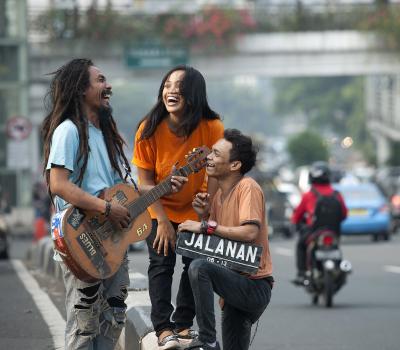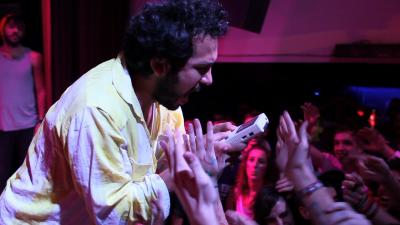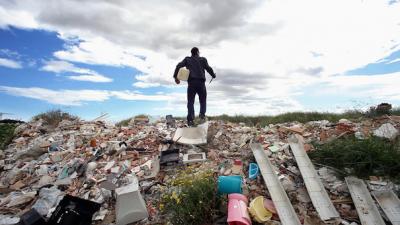
Singing in the Streets of Jakarta
Jalanan by Daniel Ziv shows the tale of Boni, Ho and Titi, three street buskers out of the Indonesian capital Jakarta. This masterfully edited portrait uses vivid storytelling methods of reality television and combines six years of footage into a compelling and beautiful tale. Resolutely unsentimental.
In Jakarta, Indonesia’s eternally traffic-choked, famously dystopic capital, there is a saying, «Ibu tiri tak sekejam ibu kota» («A stepmother is not as cruel as the capital city», literally «mother city»). Jakarta can indeed seem capricious and callous to members of Indonesia’s vast have-not majority, even those born and bred there, with its gleaming mega-malls full of merchandise no ordinary person could afford and the sprawling city’s countless other conspicuous displays of the gulf between the rich and the rest, not to mention the police-state tactics left over from the Soeharto regime that the Jakarta government still uses to terrorize the poor and defenseless.

A Society in Transition
A film by longtime Jakarta resident and Indonesian cultural observer Daniel Ziv (whose 2002 book Jakarta Inside Out is well worth a look), Jalanan is resolutely unsentimental. This docudrama about Jakarta pengamen (street buskers) is a poignant portrait of a society in transition, as a democratic Indonesia struggles to shake off the authoritarian and neocolonial legacies of its past regimes and evolve as a nation inclusive of all its citizens, no matter how humble. In 2014, there are once again hopeful signs in Indonesia, as Joko Widodo, Indonesia’s new reformer president, takes the helm, though he faces entrenched political opposition.
The Conscience of a Nation
Perhaps you need to actually spend time in Indonesia to fully understand the importance of street musicians. Although most commuters and passersby appear to ignore them, to many people they symbolize ingenuity, humor and humility in the face of misfortune, and their music represents no less than the conscience of a nation, as exemplified by the king of all street buskers, the music legend and social critic Iwan Fals, whose songs were shouted on the barricades when the Soeharto dictatorship fell amid student protests and popular uprisings (the influence of Fals is apparent in the socially-conscious compositions performed in the movie by Boni and Ho). As an anthropologist who works in Jakarta, I have seen the world of pengamen up close, a world of defiant hope amidst material deprivation and hardship, and, in my opinion, Jalanan gets it right.
Strangely Melancholy Metropolis
Dispensing with the usual dry, didactic techniques familiar to viewers of documentaries about poor people in developing countries, Jalanan opts instead for the vivid storytelling methods of reality television, customarily employed solely to portray lives of people with first-world problems. There is no voiceover narrator and almost no text. Instead, six years of footage is masterfully edited into a compelling, beautifully produced tale of Boni, Ho, and Titi, three extraordinary streetside singer-songwriters. The soundtrack, along with the film’s strangely melancholy metropolitan setting, is virtually a character in the story and includes original compositions performed by the protagonists as well as tracks by Indonesian music legend Franky Sahilatua and alternative rockers Navicula and Cozy Street Corner.
Cast
Bambang «Ho» Mulyono
Titi Juwariyah
Boni Putera
Crew
Director: Daniel Ziv
Producer: Daniel Ziv
Cinematographer: Daniel Ziv
Editor: Ernest Hariyanto
Sound Recordist: Meita Eriska
Sound Design & Mixer: Levy Santoso
Music Scorer: Dadang SH Pranoto
Indonesian Video Clips
Biography
Published on January 16, 2015
Last updated on April 10, 2024
Topics
How does this ideology, but also its sheer physical expressions such as labor affect cultural production? From hip hop’s «bling» culture to critical evaluations of cultural funding.
From Muslim taqwacore to how the rave scene in Athens counters the financial crisis.
About Tunisian rappers risking their life to criticize politics and musicians affirming 21st century misery in order to push it into its dissolution.
Why do people in Karachi yell rather than talk and how does the sound of Dakar or Luanda affect music production?
Snap







